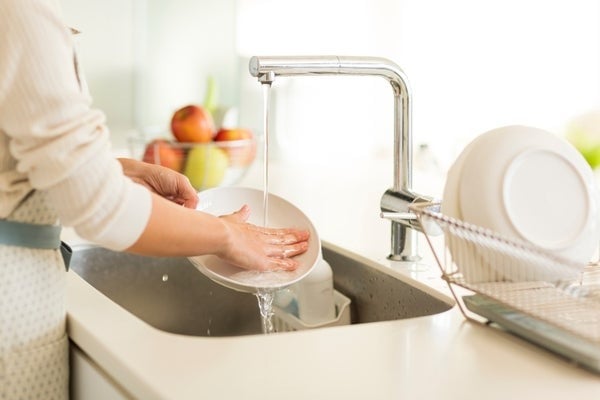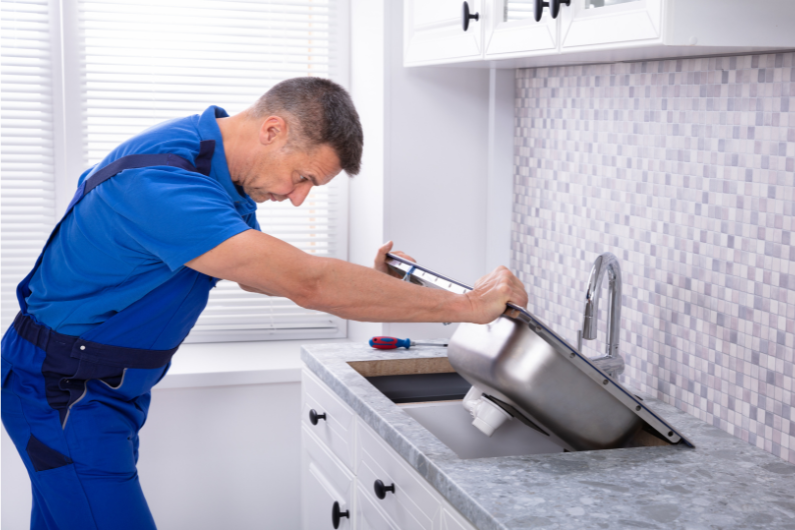We have stumbled upon the article on How to Fix a Slow Draining Sink below on the internet and accepted it made sense to share it with you in this article.

Introduction
We have actually all been there: You're cleaning your teeth or washing your hands, and you see the water pooling in the sink. Instead of swiftly swirling down the drain, it remains, turning your once-refreshing morning routine into a miniature overload scene. A slow-draining sink isn't simply irritating; it's usually an indication of larger plumbing issues prowling beneath the surface. The bright side is that many slow-draining sinks can be taken care of with a little know-how, a couple of standard tools, and some perseverance. Ready to tackle this job head-on? Allow's roll up our sleeves and dive right in.
Recognizing the Root Causes Of a Slow-Draining Sink
Before you begin poking around in your pipes, it assists to know what could be causing the downturn. Understanding the root cause makes it easier to choose the appropriate solution.
Devices and Products You'll Require
The right tools make all the difference. Thankfully, you will not require a completely equipped plumber's van to get the job done.
Step-by-Step Overview to Repairing a Slow-Draining Sink
Now, allow's get into the nitty-gritty. This detailed procedure will direct you via easy strategies to restore your sink's water drainage.
Step 1: Eliminate and Tidy the Stopper
Commonly, the stopper (that small plug you lower to obstruct water) is the first wrongdoer. Remove it very carefully and clean off any kind of hair or gunk entraped around its base. Rinse it completely prior to putting it back in place.
Action 2: Make Use Of a Plunger to Remove Particles
Got that plunger prepared? Position it over the drain and offer it a few firm pumps. The idea is to produce suction that can loosen up any type of blockage. If you see littles particles drifting up, you're on the best track.
Action 3: Attempt a Drainpipe Snake or Cable Wall Mount
If the bettor doesn't suffice, it's time to draw out the drainpipe snake. Delicately feed it into the drainpipe and spin as you go. You may really feel some resistance-- that's likely the obstruction. Maintain turning and drawing up until you eliminate the blockage. If you don't have a drainpipe snake, an aligned cable wall mount can operate in a pinch.
Tip 4: Apply a Do It Yourself Drainpipe Cleanser
A natural cleaner made from cooking soda and vinegar can break down recurring crud. Pour half a mug of cooking soda right into the drain, complied with by half a cup of vinegar. Allow it fizz for around 15 minutes, after that flush with warm water. This chemical reaction typically does wonders for small obstructions.
Tip 5: Reassemble and Examine the Sink
Placed whatever back together and run the tap. Does the water now swirl down the drain at a decent speed? If yes, offer on your own a pat on the back. If not, don't despair-- there are still a couple of more dress up your sleeve.
Necessary Devices for DIY Repairs
A bettor is your go-to beginning factor. A little, sink-sized bettor develops suction that can displace minor blockages. For even more relentless blockages, a drain serpent (occasionally called a plumber's auger) functions marvels. A pair of gloves, a flashlight, and perhaps a pair of safety safety glasses are likewise convenient.
Recommended Cleaning Solutions
Mild recipe soap and hot water can help break down oily accumulation. A mixture of baking soft drink and vinegar is a tried and true natural home remedy, and chemical cleansers use a more environmentally friendly approach. Keep chemical drain cleansers as a last hope, as they can be extreme on your pipes.
Usual Perpetrators Behind Slow Water Drainage
So, what's clogging things up? Typically, it's a combination of daily particles-- think hair, soap scum, toothpaste residue, and leftover food particles. In time, these little bits gather and hold on to the pipeline walls, progressively narrowing the passage and making it harder for water to pass through. In many cases, mineral deposits from difficult water can likewise add to the substance, creating the best storm for stubborn clogs.
When is it Time to Take Action?
If you observe the water draining pipes slower than usual, it's an excellent concept to step in quicker rather than later on. Waiting as well long can lead to finish clogs, undesirable odors, or even pipeline damages. If the water takes greater than a few seconds to clear out after switching off the faucet, consider it a warning and get ready to put on your do it yourself hat.
Safety First: Precautions and Prep work
Prior to you launch into unclogging mode, think of security. You're dealing with possibly unclean water and particles, so slip on a set of handwear covers. If you're utilizing chemical cleansers, make sure the space is well-ventilated and comply with the guidelines on the label.
Protective Equipment and Workspace Setup
Put down some old towels or rags around the sink area to capture dashes. Remove any things that may get in your method, like soap dispensers or toothbrush holders. Ensure you have excellent lights-- order a flashlight if required.
Different Techniques for Stubborn Clogs
Not all obstructions are created equal. If your sink still declines to work together, take into consideration these alternative remedies.
Baking Soda and Vinegar Technique
We currently discussed this, but it's worth noting once again. This gentle, green method is safer than chemical cleansers and frequently quite effective.
Enzymatic Drainpipe Cleaners
Enzyme-based cleaners make use of all-natural germs to digest organic matter. They're an exceptional option if you're seeking to avoid harsh chemicals. Simply keep in mind, they might take a bit longer to work their magic.
Chemical Drain Cleaners: Benefits And Drawbacks
Chemical cleaners can blow up with challenging clogs quickly, yet they're not without disadvantages. They can create warmth and fumes, damage pipelines if utilized excessively, and position ecological threats. Use them moderately, and constantly follow the instructions thoroughly.
Preventive Measures to Keep Your Sink Flowing
Avoidance is the most effective cure. By taking on a few basic practices, you can maintain your sink from slowing down to begin with.
Regular Cleaning Practices
Wipe down the sink basin and component location routinely. Eliminate hair or food fragments before they have a chance to wash down the drainpipe.
Preventing Unsafe Materials Down the Drain
Think twice before disposing coffee premises, oil, or coarse vegetable scraps down the sink. These wrongdoers cling to pipeline walls, developing obstructions in time.
Regular Maintenance Checks
Set up a quick month-to-month evaluation. Run warm water through the sink for a couple of mins, paying attention to the circulation. If it appears sluggish, act quick prior to it becomes a full-blown blockage.
When to Call a Specialist Plumbing
Often, despite just how tough you attempt, that obstruct simply will not budge. That's when it's time to generate the pros.
Signs That Suggest a More Serious Concern
If your sink drains pipes slowly regardless of numerous attempts, or if you observe water backing up in various other components (like your shower or toilet), you might have an extra significant pipes issue lurking much deeper in the system.
Stabilizing DIY Efforts with Expert Aid
While DIY can save you cash and provide a sense of success, there's no embarassment in calling a professional. A professional plumbing can analyze your entire pipes setup, making certain there's no underlying damage or long-lasting trouble that could cost you a lot more down the road.
Comparing Expenses and Long-Term Solutions
Prior to making a decision, think about the big picture. An inexpensive, quick fix may fix the trouble momentarily, yet investing in a more permanent service might save you cash and stress in the long run.
Evaluating the Expenditures of Do It Yourself vs. Specialist Repairs
DIY repairs frequently cost little more than the price of a bettor or a bottle of baking soft drink. Specialist services, on the other hand, come with a cost yet might protect against repetitive concerns and costly fixings later.
Buying Top Quality Fixtures and Upgrades
If your sink's style adds to frequent clogs, it might be worth updating to higher-quality components or modifying the plumbing design. Consider this a financial investment in your home's capability and convenience.
Verdict
A slow-draining sink can seem like a minor irritability, however it's commonly an indication that your plumbing requires a little tender loving care. By recognizing the source, using the right devices and strategies, and committing to basic preventive measures, you can maintain your sink flowing easily. And when all else stops working, never hesitate to call a specialist-- your home's plumbing deserves the investment in care and upkeep.
Three Common Ways to Fix a Slow Drain
Baking Soda Method
Boil a full pot of water. Measure out cup of baking soda and pour it down the drain. Then take cup of the magical cleansing substance known as white vinegar and drop that down there too. Allow the mixture to fizz in the drain for five minutes as the vinegar and baking soda combine. Now dump in that whole pot of boiling water. This combination of cleaning substances should clear out anything that is causing your sink to drain slowly. If it doesn t...
Zip-It
If the baking soda method doesn t clear out your drain, it may be because a significant amount of hair and/or other debris has collected there and you need to remove it. Purchase a Zip-It tool at any home improvement or hardware store and insert it into your drain. It will catch any collected hair or debris that s blocking the flow of water. Pull it out. If it s got a big clump of hair, etc. on the end, you ve probably got your culprit.
Drain Cleaner
If these methods don t work, there is the standard drain cleaner that you can also buy in a hardware store or even your local grocery store. It s better if you can use a household solution, but these drain cleaners often work in a pinch. They re very simple to use. You generally just dump them in your drain and wait. If even this method is not effective, it may be time to call the plumber.
https://www.mrrooter.com/oneida/about-us/blog/2017/july/three-common-ways-to-fix-a-slow-drain/

Do you like reading up on Solved! How to Fix a Slow Sink Drain? Place a remark further down. We will be glad to know your ideas about this blog posting. Hoping that you come back again soon. Sharing is caring. Helping others is fun. I truly appreciate your readership.
Hire A Pro
 Jeremy Miller Then & Now!
Jeremy Miller Then & Now! Joshua Jackson Then & Now!
Joshua Jackson Then & Now! Monica Lewinsky Then & Now!
Monica Lewinsky Then & Now! Nancy Kerrigan Then & Now!
Nancy Kerrigan Then & Now! Richard Dean Anderson Then & Now!
Richard Dean Anderson Then & Now!